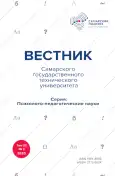Управление педагогической ситуацией: практические аспекты
- Авторы: Доброва В.В.1
-
Учреждения:
- Самарский государственный технический университет
- Выпуск: Том 22, № 2 (2025)
- Страницы: 89-100
- Раздел: Теория педагогики
- URL: https://bakhtiniada.ru/1991-8569/article/view/310343
- DOI: https://doi.org/10.17673/vsgtu-pps.2025.2.6
- ID: 310343
Цитировать
Полный текст
Аннотация
Педагогическая ситуация рассматривается с позиций педагогического управления. Проведенное исследование имеет практическую ориентацию и направлено на систематизацию способов повышения эффективности управления педагогической ситуацией. Рассматриваются две основные стратегии педагогического менеджмента: предотвращение проблем до их возникновения и реагирование на них после их возникновения. Показано, что многие проблемы управления можно предотвратить, если обратить внимание на использование учебного пространства, установление правил поведения, правильное структурирование педагогических ситуаций и передачу информации, четкое изложение инструкций, а также донесение до учеников важности обучения и позитивного поведения.
Полный текст
Открыть статью на сайте журналаОб авторах
Виктория Вадимовна Доброва
Самарский государственный технический университет
Автор, ответственный за переписку.
Email: victoria_dob@mail.ru
ORCID iD: 0000-0002-3037-4797
кандидат психологических наук, доцент, заведующий кафедрой «Иностранные языки»
Россия, ул. Молодогвардейская, 244, Самара, 443100Список литературы
- Яковлева Н.М., Яковлева Н.О. Педагогическое управление: сущность, значение и содержание // Современная высшая школа: инновационный аспект. – 2011. – № 4. – С. 34–44.
- Доброва В.В. Роль концепта «педагогическая ситуация» в терминологическом строе наук об образовании: междисциплинарный анализ // Вестник Армавирского государственного педагогического университета. – 2023. – № 1. – С. 39–50.
- Dobrova V.V. On one type of pedagogical situations: classification and practical aspects. Vestnik of Samara State Technical University. Series: Psychological and Pedagogical Sciences. 2023. Vol. 20. No. 1. Pр. 77–86. doi: 10.17673/vsgtu-pps.2023.1.6.
- Якунин В.А. Педагогическая психология. – СПб.: Полиус, 1998. – 639 с.
- Jones V., Jones L. Comprehensive classroom management: Creating communities of support and solving problems. 6th edition. Boston: Allyn & Bacon. 2006. 231 p.
- Левина Т.В., Иванова В.А. Психология и педагогика. – Красноярск, 2008 [Электронный ресурс]. – URL: http://www.kgau.ru/distance/mf_01/psi-ped/index.html (дата обращения: 03.12.2024).
- Анисимов О.С. Новое управленческое мышление: сущность и пути формирования. – М.: Экономика, 1981. – 351 с.
- Конаржевский Ю.А. Менеджмент и внутришкольное управление. – М.: Центр «Педагогический поиск», 2002. – 222 с.
- Шакуров Р.Х. Социально-психологические основы управления: руководитель и педагогический коллектив. – М.: Просвещение, 1990. – 208 с.
- Симонов В.П. Педагогический менеджмент. Ноу-хау в образовании: учеб. пособие. – М.: Высшее образование; Юрайт, 2000. – 357 с.
- Classroom management. Washington: Peace Corp. 2021. 321 p.
- Good T., Brophy J. Looking in classrooms. Boston: Allyn & Bacon. 2002. 129 p.
- Seifert K., Sutton R. Educational Psychology. Second Edition. Global text, 2009. 376 p.
- Brophy J. Motivating students to learn. 2nd edition. Mahwah, NJ: Erlbaum. 2004. 233 p.
- Britt T. Effects of identity-relevance and task difficulty on task motivation, stress, and performance. Motivation and Emotion. 2005. No. 29 (3). Pр. 189–202.
- Van Meerionboer J., Kirschner P., Kester L. Taking the cognitive load off a learner’s mind: Instructional design for complex learning. Educational Psychologist. 2005. No. 38 (1). Pр. 5–13.
- Chesebro J. Effects of teacher clarity and nonverbal immediacy on student learning, receiver apprehension, and affect. Communication Education. 2003. No. 52 (2). Pр. 135–147.
- Marks L. Instructional management tips for teachers of students with autism-spectrum disorder. Teaching Exceptional Children. 2003. No. 35 (4). Pр. 50–54.
- Marzano R., Marzano J. The key to classroom management. Educational Leadership. 2004. No. 62. Pр. 2–7.
- Kounin J. Discipline and group management in classrooms. New York: Holt, Rinehart & Winston, 1970. 254 p.
- Emmer E., Stough L. Classroom management: A critical part of educational psychology, with implications for teacher education. Educational Psychologist. 2001. No. 36 (2). Pр. 103–112.
Дополнительные файлы







